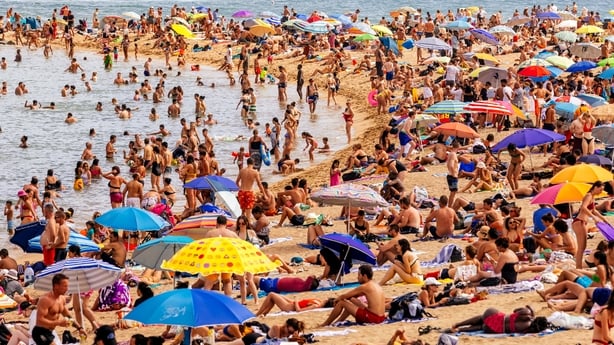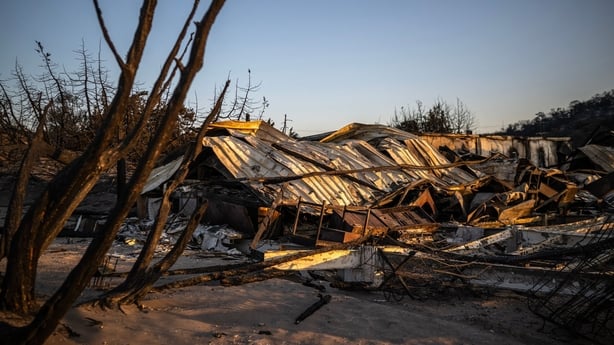Destructive fires, temperatures topping 40C and tourists dodging possible catastrophe by staying home. Will climate change end up transforming tourism, particularly in the Mediterranean?
Regions which welcome a sizeable share of holidaymakers are also those hardest hit by climate change.
Following suffocatingly hot weather in Greece, thousands have flown home in recent days as blazes ravaged the islands of Rhodes and Corfu.
Rhodes' international airport has morphed into an improvised campsite flooded by disorientated tourists.
Other countries around the Mediterranean have also been hit.

In Spain, the thermometer shot up 15C above normal summer season levels.
Italy has also been roasted, with Sardinia hitting 48C.
Tunis went one better (or worse) at 49C.
Tourism plays a key role in the region's economies; the sector accounts for nearly a quarter of GDP in Greece and 12% in Spain.
Economic consequences
These soaring temperatures could turn off visitors.
For Jean-François Rial, who heads French travel firm Voyageurs du Monde, "global warming is going to render some destinations less and less visitable".
"The whole of the Mediterranean is concerned and yet it is the main destination of European travellers," he said.
In Spain, "we're starting to hear tourists ask themselves" if they should be looking to spend their summer break on the Mediterranean coast, said Joantxo Llantada, a professor at Madrid's IE Business School.
The credit ratings agency Moody's warned that "heatwaves may reduce Southern Europe's attractiveness as a tourist destination in the longer term or at the very least reduce demand in summer".
This "will have negative economic consequences given the importance of the sector," he warned.

The end of sun-worshipping?
Not so fast, cautions Hamit Kuk, who heads the association of Turkish travel operators.
"This issue is very important for the tourism industry, but it is not a problem if temperatures are very hot in Antalya, because European tourists mostly prefer to see the sun," he claimed.
"We can look at the examples of Egypt and Dubai. In July/August there are temperatures of 45C and tourists still prefer to go there."
President of Tunisia's hotel federation Dora Miled said that to date "the heat has had no impact on tourism".
But he acknowledged that numbers are still below pre-pandemic levels.
"If we have yet to return to 2019 activity levels that's above all mainly due to the high cost of air travel," he insisted.
Didier Arino, who heads the Protourisme travel consultancy in France, said: that "people don't dream of a cool destination, they want good weather".

Even in Greece, there are some reports that suggest that the fires may not dissuade tourists from coming.
Kostas Chryssohoides is the vice prefect of Dodecanese, an island group in the southeastern Aegean Sea that includes Rhodes.
He observed that "24,000 tourists arrived on Rhodes" between Sunday and Monday, fires notwithstanding.
Despite some tour operators cancelling flights, only a handful of tourists cancelled "as a precaution", he claimed.
Silver lining?
Should it become next to impossible to visit a destination sweltering under abnormal temperatures, holidaymakers could look further afield, suggests Jean-Francois Rial, who said that "northern European destinations are on the rise".
He suggested that Ireland and Britain could gain in tourist traction.
One thing sector professionals do agree on is that tourism will change.
They anticipate that total visitors to the Mediterranean could rise off-peak, boosted by increasing demand from pensioners.
"For now we have no worries about domestic market demand, but if the global climate crisis continues to escalate, we will have to review the summer and winter seasons," said Hamit Kuk.
In Rial's view, "that could perhaps be a chance to reduce 'over-tourism'... losing some clients in summertime but gaining more in the other nine months of the year."
Albania is hoping to cash in on that, with a warm season that stretches into October. The country is currently experiencing a boom in tourism, and forecasts a 30% jump in arrivals this year.
In Croatia, where tourism accounts for 20% of the economy, experts are pushing the development of the country's Adriatic coastline, which could benefit rural regions.


